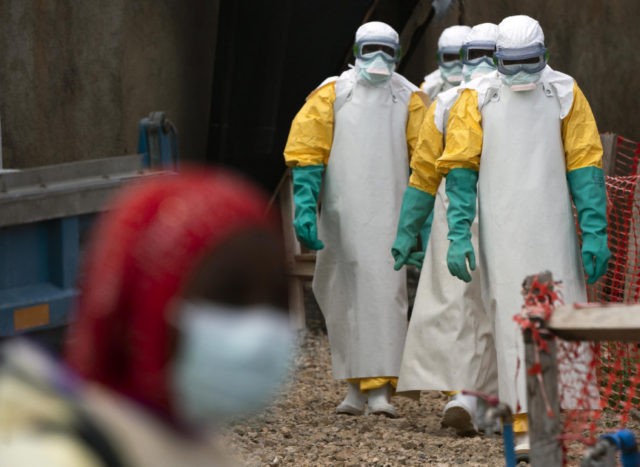Unknown assailants stabbed a journalist to death in Democratic Republic of Congo (DRC) known for warning on radio about the spread of Ebola, the country’s military confirmed on Sunday.
Papy Mahamba Mumbere, 35, was stabbed to death in the town of Lwemba in the Ituri region close to the border with South Sudan and Uganda, which is one of the country’s areas most affected by the ongoing Ebola epidemic.
He had been working as a radio host who regularly warned listeners about the impact of the potentially deadly impact disease. The assailants also wounded his wife and burned down their house.
The Observatory of Freedom of the Press in Africa (OLPA) confirmed that he was “savagely murdered, on the afternoon of November 2 at his home, by unidentified individuals with white weapons [knives].”
“After having mutilated the journalist, the assailants also wounded his wife before setting his residence on fire,” the organization said in a statement, calling on authorities to conduct a “serious investigation” into the crime.
The exact motive for the murder remains unknown, although it follows rising instances of violence and intimidation against anti-Ebola campaigners and healthcare workers. In many areas of rural Africa, local communities fear Western-style medical practices and have been known to attack healthcare workers; DRC in particular has experienced a growing sense of distrust and rejection of Ebola treatment among poorer communities.
In April, a doctor working with the World Health Organization (WHO) was shot dead in an attack on a hospital in North Kivu province. A nurse and police officer have also been killed since the outbreak of the epidemic in August 2018. In September, militiamen torched around 20 homes of health workers combating the virus around Mambasa.
According to figures from the WHO, over 2,000 people have died as a result of 3,000 confirmed Ebola cases in the current outbreak, with the organization in July declaring it a “public health emergency of international concern.” It is considered the second-deadliest outbreak on record, the first being the west Africa outbreak of 2014-2016.
The transmission of Ebola typically takes place by direct contact between individuals. Symptoms of the virus typically begin with sudden fever, intense weakness, muscle pain, and a sore throat, before later progressing to vomiting, diarrhea and both internal and external bleeding. Fatalities are usually a result of dehydration and organ failure.
This weekend, Congolese officials announced that they had received 11,000 doses of a new anti-Ebola vaccine from Belgium, the country’s former colonial ruler. The vaccine, an experimental product developed by U.S. pharmaceutical giant Johnson & Johnson, will be implemented on those living outside Ebola transmission zones in order to protect them against future contagion.
Congolese officials had already administered thousands of doses of a one-dose vaccine manufactured by Merck. Health officials deemed the Merck vaccine highly effective and better suited to rural areas, given the fact that doctors would not have to track down patients for a second dose. There is no shortage of the Merck vaccine. Yet the World Health Organization (WHO) and other international groups have for months pressured DRC to accept the second vaccine. Former Congolese Health Minister Oly Ilunga resigned from his position in July in protest of the pressure to impose the Johnson & Johnson vaccine, warning that two vaccines would trigger more confusion, outrage, and violence.
“[It is] fanciful to think that the new vaccine proposed by actors who have shown an obvious lack of ethics by voluntarily hiding important information from medical authorities, could have a significant impact on the control of the current outbreak,” the former minister’s resignation letter read.
Follow Ben Kew on Facebook, on Twitter at @ben_kew, or email him at bkew@breitbart.com

COMMENTS
Please let us know if you're having issues with commenting.